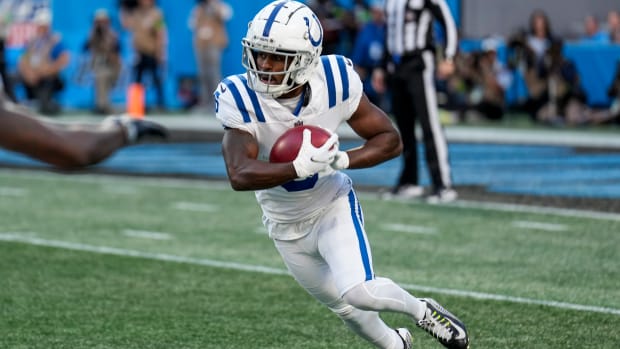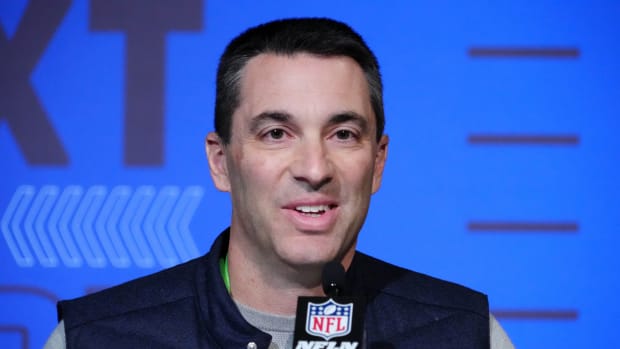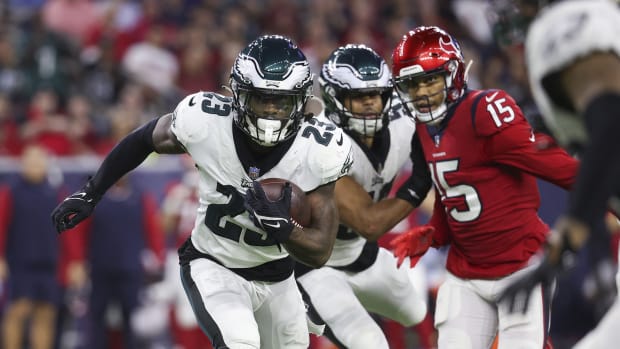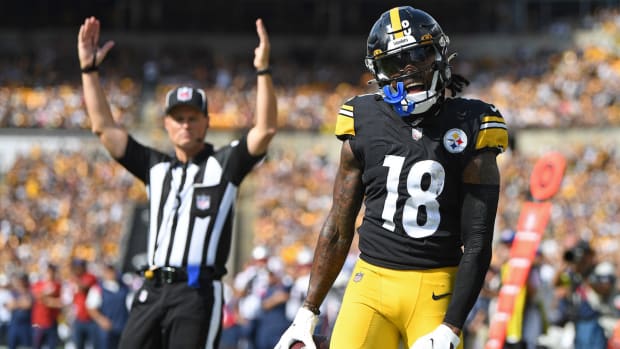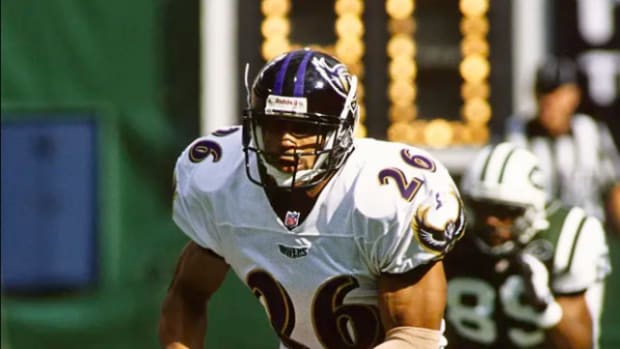How Belichick’s Master Plan Unfolded
ATLANTA — Fifteen minutes after the final gun sounded for Bowl XLIII, Jared Goff, wearing only blue spandex pants, sat at his locker, head in his hands, face puffy with emotion. Eventually he got up and went over to 10-year veteran center John Sullivan, who was at his locker, fully dressed.
Sullivan, 33, is the sagacious on-field brain of L.A.’s offense; when he first came aboard in 2017, then-first-year head coach Sean McVay would censure him for calling out the defense at practices before others—including Goff—could possibly decipher it themselves. At Sullivan’s locker on Sunday, the veteran center and third-year quarterback whispered back and forth, Goff describing plays with slow, sweeping arm motions, Sullivan, hands in his pockets, nodding patiently.
Patriots Fans, Purchase Your Sports Illustrated Super Bowl LIII Commemorative Issue Here!
Goff finished Super Bowl LIII with just 19 completions on 38 attempts. He passed for an unimpressive 229 yards and, in the final minutes, underthrew a critical red zone fade to Brandin Cooks that Patriots corner Stephon Gilmore anticipated and easily intercepted. (Goff this season had shown a tendency to throw that ball to Cooks in that part of the field.) The high-powered offense that Goff oversees punted nine times, more than three times its season average. And so the narrative this offseason will be that the young QB stepped onto football’s grandest stage and choked.
But the Patriots defense presented Goff with a gameplan few quarterbacks could swallow. It was perhaps the most masterful strategizing seen from Bill Belichick since the last time he bested a juggernaut Rams offense, in Super Bowl XXXVI. In that Super Bowl, Belichick unveiled the totally unexpected tactic of hitting running back Marshall Faulk every time he released into a route. In this Super Bowl, Belichick unveiled another unexpected tactic: Quarters coverage, a matchup zone concept where the two outside corners and two deep safeties each cover one-fourth of the field.
“We anticipated that we would see some unscouted stuff,” said Sullivan. “Playing Cover-4 was unscouted. Or it was different from them, let’s put it that way.” The Rams had struggled against Quarters earlier in the season, most notably in Week 13 at the Lions, who deployed it for the first time under head coach Matt Patricia, the recent Patriots defensive coordinator who runs a Belichick-style man-to-man scheme.
Patriots Fans, Get Your Super Bowl LIII Championship Gear here!
“The gameplan tonight kind of unfolded the way we wanted it to unfold,” said one Patriots defensive assistant. “We didn’t execute it perfectly, but our players did a really good job of marrying the rush with the coverage and handling this scheme.”
Quarters is usually seen on passing downs, but the Patriots, just like the Lions, employed it on first and second down. That’s when L.A.’s passing game, predicated heavily on play-action, is at its most dangerous. In Quarters, the two inside safeties can take away the slant and post routes that Goff throws with such great anticipation. For good measure, the Patriots beefed up their coverage prowess by replacing free safety Duron Harmon with cornerback Jonathan Jones, a third-year slot corner who had not played safety until this game. “I knew it was in the gameplan from the beginning,” Jones said. “Just something we adjusted. That’s the name of the game.”
Because it puts both safeties back, it’s dicey to play Quarters against a strong running team like Los Angeles, which is why Belichick featured a second schematic wrinkle: 6-1 fronts. New England’s outside linebackers aligned up on the line of scrimmage, taking away the edges that L.A.’s foundational outside-zone runs aim to exploit. With those edges secure, New England’s interior defensive linemen were more inclined to penetrate gaps, as opposed to just clogging them. That disrupted L.A.’s run-blocking cohesion. Even better, it disrupted parts of the Rams’ passing game, which has been praised all season for being so well married to that run game. That marriage begins with the Rams placing receivers in tight splits, just a few yards off the ball, as opposed to out wide. It’s an unconventional approach that presents more route running opportunities, especially on play-action.
“Those splits are probably the biggest challenge [of L.A.’s offense],” said defensive play-caller Brian Flores. “You get the [tight] splits, motion to various formations and a lot of great skill players.”
If you want the latest episode of The Monday Morning NFL Podcast in your feed when you wake up Monday morning, then subscribe to The MMQB Podcasts. (For non-subscribers, there is typically a lag.)
But having those edge linebackers up on the line of scrimmage crowded the tight-split receivers, and as the game progressed, the Rams got away from the tactic. Now playing in wider formations, their zone running game deteriorated, as did their inside play-action game and, therefore, their intermediate crossing routes. The Rams also stopped getting to the line of scrimmage quickly and calling audibles—a ploy made famous by McVay. Put it all together and the Rams skill players were like great dancers suddenly moving to an unfamiliar song. With no first and second down success, they faced a slew of third downs, when their pre-snap bells and whistles don’t work. That’s when the Patriots unleashed the complex five-man amoeba blitzes they’ve employed more often down the stretch.
The Rams had seen those exotic pressures on film from New England, but the pressures, “are a different animal when you’re actually picking it up as opposed to when you’re preparing for it,” said Sullivan. Goff was sacked four times, including twice by blitzing linebacker Dont’a Hightower. The Rams on third down were as arrhythmic as on first and second down. The Rams endured an outright butt-whooping at the hands of an only modestly talented Patriots defense. Afterwards, McVay put it succinctly: “I got out-coached.”
He’s not the first Super Bowl foe Belichick had done that to.
• Question or comment? Email us at talkback@themmqb.com.
































